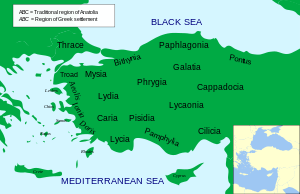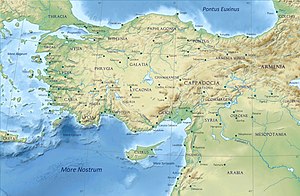
Back Lycaonia Afrikaans ليكاونيا Arabic Ликаония Bulgarian Licaònia Catalan Lykaonien German Λυκαονία Greek Licaonia Spanish Likaonia Basque لیکعنیا Persian Lykaonia Finnish
| Lycaonia | |
|---|---|
| Ancient Region of Anatolia | |
| Location | South-eastern Anatolia, Turkey |
| State existed | Quasi-independent until c.200 BC |
| Roman province | Cappadocia |
 | |
 | |

Lycaonia (/ˌlɪkiˈoʊniə/; Greek: Λυκαονία, Lykaonia; Turkish: Likaonya) was a large region in the interior of Asia Minor (modern-day Turkey), north of the Taurus Mountains. It was bounded on the east by Cappadocia, on the north by Galatia, on the west by Phrygia and Pisidia, while to the south it extended to the chain of Mount Taurus, where it bordered on the country popularly called in earlier times Cilicia and in the Byzantine period Isauria; but its boundaries varied greatly at different times. The name is not found in Herodotus, but Lycaonia is mentioned by Xenophon as traversed by Cyrus the Younger on his march through Asia. That author describes Iconium as the last city of Phrygia; and in Acts 14:6 Paul, after leaving Iconium, crossed the frontier and came to Lystra in Lycaonia. Ptolemy, on the other hand, includes Lycaonia as a part of the province of Cappadocia, with which it was associated by the Romans for administrative purposes; but the two countries are clearly distinguished both by Strabo and Xenophon and by authorities generally.